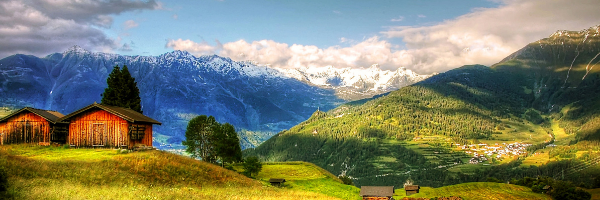It’s an Opera, It’s a Pop Tune, It’s “The Green Hills of Tyrol”

In my part of the world, “The Green Hills of Tyrol” is a staple of massed band performances. You can count on hearing it at some point at the beginning and end of each games day. It’s also used frequently for pipe band tuning—the second part is quite effective, since you are basically playing down the scale from High A. But this little workhorse of a tune is one of the oldest pipe band tunes in our repertoire today, and has quite an amazing story.
This tune originated as a European folk tune, and was used by Gioachino Rossini as a chorus in "La Tua Danza Sì Leggiera", in the third act of his 1829 opera, William Tell. Pipe Major John MacLeod of the 93rd Sutherland Highlanders reportedly heard it performed by a Sarinian military band while serving in the Crimean War and transcribed it to the pipes in 1854. William Tell was a Swiss folk hero who reportedly frequented the "green hills" of Tyrol, so the name of the tune likely came from this connection, rather than the popular but disproven notion that PM MacLeod was stationed in Tyrol when he transcribed the tune.
“Green Hills” has remained a hugely popular bagpipe tune for more than a century and a half. It is still one of the most recognized piping tunes in the repertoire, thanks to Andy Stewart. In 1960 Stewart, a Scottish pop singer just beginning his long musical career sat down with BBC arranger Iain MacFadyen and produced “A Scottish Soldier” based on this pipe tune he had heard as a boy at the Braemar Highland Gathering. The story of a dying Scottish soldier wishing to return home rather than die in Tyrol became a worldwide popular hit. In 1961 it reached number 1 on the charts in Canada, Australia and New Zealand, and spent a full year in the US top 50. This is why you might still hear the general public request this tune by the title “A Scottish Soldier.”
So, the next time you’re lining up for massed bands and the Drum Major calls out “tune is . . . Green Hills” don’t moan and say “not again!”. Think about the history of the tune, its origins, its transformations and its rebirths. Play it like you mean it.
Here are Andy Stewart's lyrics to "The Scottish Soldier" sung to the tune of "The Green Hills of Tyrol."
“The Scottish Soldier” – by Andy Stewart
There was a soldier, a Scottish soldier
Who wandered far away and soldiered far away
There was none bolder, with good broad shoulder
He's fought in many a fray, and fought and won.
He'd seen the glory and told the story
Of battles glorious and deeds nefarious
But now he's sighing, his heart is crying
To leave these green hills of Tyrol.
Chorus:
Because these green hills are not highland hills
Or the island hills, they're not my land's hills
And fair as these green foreign hills may be
They are not the hills of home.
And now this soldier, this Scottish soldier
Who wandered far away and soldiered far away
Sees leaves are falling and death is calling
And he will fade away, in that far land.
Chorus
He called his piper, his trusty piper
And bade him sound a lay... a pibroch sad to play
Upon a hillside, a Scottish hillside
Not on these green hills of Tyrol.
And so this soldier, this Scottish soldier
Will wander far no more and soldier far no more
And on a hillside, a Scottish hillside
You'll see a piper play his soldier home.
He'd seen the glory, he'd told his story
Of battles glorious and deeds victorious
The bugles cease now, he is at peace now
Far from those green hills of Tyrol.
Chorus
Review Green Hills of Tyrol in the Dojo U Library.






Responses